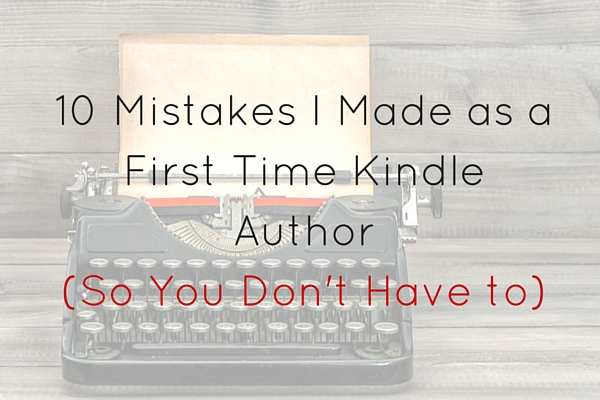10 Kindle Mistakes To Avoid as a New Author
Over the last two years one of the biggest trends I’ve seen, is people having success self-publishing books on Kindle. I have friends that are making 5 figures monthly, by building their small publishing empire.
There’s a good chance you’ve been interested in writing a book of your own, so I enlisted Noam Lightstone to share with you his experience, and in particular share his 10 biggest Kindle mistakes that he made when publishing his first book.
If you’re thinking of writing a book for Kindle, or even if you already have, take some time and read through this to ensure you set yourself up for the best chance of success!
Take it away, Noam!
—
I have always been a writer, ever since I was a kid. And even in school, the formatting, teasing out, and creation of a 400 page thesis got me going. Well, OK it also drove me a bit crazy but you can’t have the good without the bad…
So I decided to write my first book, Mastery Of The Mind, back in September for my blog, Light Way Of Thinking. My hope was that I’d sell only one copy and eventually, make $100 a month. If I did that I’d be floored.
The results were FAR beyond my expectations:

Breaching top 1000 of ALL books in Kindle store, dual #1 bestseller status in two categories, and also breaching top 20 books in Self-Help.

Being #10 in Self-Help category – beating out heavy weights Stephen Covey, Eckart Tolle, and Dale Carnegie.
Launch And First Month Stats:
- First month copies sold: Nearly 2000 (1812)
- First month revenue: ~ $3K USD
- During first week: Broke top 100 in Canada, top 1000 in US (of all books in Kindle store)
- Triple #1 bestseller in Canada during first month
- Dual #1 bestseller in US during first month
You can check out the book here
But after taking months to write the book and delaying publishing for so long (ah the fears of the entrepreneur!), when I look back I realize I made A LOT of mistakes.
There are great guides around that go into the mechanics of writing a book for Amazon and the Kindle Store. They cover topics like keyword research, category selection and so on. Some great posts sit here at L180 by Lise Cartwright and Tristan King. I’ll also share some more resources at the end of the article.
But what I wanted to detail here in this article are the things I didn’t do so well. These are things I will improve on for my next book.
My hope that if you choose to write a book and/or publish it with Amazon and Kindle Direct Publishing, you will be saved hours of stress and tears from my mistakes and I give you action steps to address each mistake so you can tackle them as you write..
So here they are:
1) Write the entire book in Scrivener, learn how to use it, and keep all editing localized to it.
My friend had told me about Scrivener and I think he first heard about it from Tim Ferriss. It’s an alternative you should use compared to Word. Why? Word for large documents is slow, unruly, and can crash. Also, your book file can become corrupt – Say goodbye to all your hard work if you don’t have a back up! I’m not kidding. Hours of writing can disappear.
Scrivener is made for screenplays and large amounts of text.
I simply started writing with it but didn’t really know how to use the program. Sure, making chapters and sections is great, but it’s actually much more powerful.
You can automatically add in with a few keystrokes:
- Chapter numbering
- Paragraph indents and spacing
- Top of the page chapter titles
- Fancy images separating chapters
- Etc.
So not only did I waste time on formatting which the software can do automatically… But I exported a Word version to my editor, who made comments/changes to it, which I then had to transcribe BACK into Scrivener, where I had to manually enter in carriage returns and everything.
Going back, I would have kept everything localized in Scrivener and saved myself hours of annoyance and stress. Scrivener also immensely helped when formatting the book for submission to Amazon’s Createspace program, which helps you turn your e-books into paperbacks with a few clicks.
Scrivener can even automatically export a very nicely formatted version off for direct Kindle publishing (MOBI file), whereas in Word I believe you must use code to do so. I don’t think I even have to go into why formatting a 100-150 page book with code to get everything to look right can just downright suck.
ACTION STEP: Buy a license for Scrivener and download it now.
Scrivener costs about $50 or less, but for the time it saves in formatting, outsourcing, and hair pulling… it’s worth it. Grab it from the Literature and Latte site (I don’t make any money off this link, I just think it’s an awesome program).
2) Don’t use tables in the book if possible.
Kindle sucks for displaying tables. They get messed up, jumbled, and split on to different pages… especially on mobiles.
If I would include a table now in a book, I’d probably use an image instead unless the table was extremely simple. Or better yet, I’d just use plain text if at all possible.
Clear writing is good writing, and nothing kills a book like jumbled, unruly text.
ACTION STEP: Preview or Remove All Tables
If you insist on using tables in your book, preview ALL tables in your book on multiple platforms to ensure that everything is OK. Or even better, remove all the tables in your book and use plain text, or consider using actual images of tables instead (screenshots from a word processor).
3) Ask people who get your advanced copies to SAY that they got advanced copies if/when they submit reviews.
“Get advanced copies” is all over the Kindle blogosphere as advice. It makes sense – One of the first things I personally look for (and I’m sure you do too) when purchasing new stuff is what other people have said about it.
Social proof works.
But what NEEDS to be done, especially as a first-time author, is making sure that these people EXPLICITY SAY IN THEIR REVIEWS THAT THEY GOT ADVANCED COPIES.
After sending out around 200 copies around 2 months before release, I got a lot of great, positive reviews during my launch.
But I didn’t ask people to note that they got these copies in advance.
A day after release, it looked like 10-12 people bought my 200+ page book, read it, did exercises that could take weeks to do, and said that the book really helped them in their lives.
…And what happened is a lot of people called my reviews fake.
I responded to one of these comments, and people seemed to get the idea/it didn’t seem to affect sales much. People even responded saying “Thanks for clarifying!”, but who knows.
It caused a HUGE amount of stress for me.
I don’t blame people for calling me out, I’d call BS as well. There’s a lot of crap in the Kindle store these days so people now act as watch dogs and are very careful about fake things floating around – they want people to be aware. This is good, but again, it can really hurt you if you don’t address it.
It’s quite possible even now that people don’t read the reviews and see my responses, passing my book up. They just see “Fake Reviews”, say “**** it”, and move on.
So save yourself the stress – send out your advanced copies, but make sure people say in their reviews that the copies were sent way before publication.
Tons of authors send out advanced copies and there’s nothing wrong with it, you just need to be honest with your potential buyers.
ACTION STEP: Email everyone who received an advance copy, and TELL them to state that they received it early in their review.
When sending out advanced copies to friends, family, and your mailing list, EXPLICITLY write in your e-mail and bring people’s attention to the fact that they should mention that they got an advanced copy of the book before the publication date in their reviews.
This is an entirely preventable problem that I learned the hard way.
4) The first week or so around publishing will consist of 12+ hour days. Get comfy.
I didn’t expect to be so busy after publishing my book.
In fact I think a lot of location independent entrepreneurs mis-judge the amount of work that goes into a product launch. I actually wrote a report for you on 5 ways you can relieve your stress and power up your progress, especially as you travel the world. You can grab that at the end of the article if you’re interested!
I thought it’d be just clicking the “Save and Publish” button, and waiting to see sales come in. Sure, I was partly obsessive and excited (who wouldn’t be??) and I did have some setup to do as a first-time author, but there’s a lot of work that goes around publishing.
You should expect to be:
- Doing final checks and edits.
- Responding to blog/book questions.
- Posting on your blog as per usual.
- Sharing content and making conversations on social media.
- Writing guest posts on relevant blogs.
- Generating buzz.
- Running/co-ordinating marketing campaigns.
- Checking sales metrics and stats.
- Co-ordinating your BuckBooks promotion (I think this is one of the SINGLE most important things I did. Get in touch with these guys! They are awesome!).
- And more.
I didn’t realize all this would come at once, but it happens and you will be super busy. Expect it, and don’t plan any parties during this time… until after release when you can celebrate :).
ACTION STEP: Expect the work, stock up on Ramen noodles.
Also: Make sure you’re on top of your productivity game and have a good system so you don’t burn out.
5) Know the International rules for Amazon’s Audiobook Creation Exchange
Submitting your Kindle book for direct translation into an audiobook using Amazon’s Audiobook Creation Exchange (ACX) service is ONLY available to residents of US/UK. Make sure you enter proper tax info to save yourself money!
I wasted A LOT of time contemplating doing an ACX version of my book.
Is the royalty deal worth it?
Can I make a better product somewhere else for cheaper?
Is it OK being locked in for 7 years?
…Only to read later upon trying to sign up that ACX is only available to residents of the US/UK. That leaves me as a Canadian, out. Knowing this beforehand would have saved me hours of deliberation and research.
Along with that, Amazon withholds tax unless you prove your country will tax you/enter this as tax info. For Canadians, enter the non-US tax number in Amazon as your SIN (social insurance number). You will see Amazon report that it now holds 0% of earnings.
You should be aware that if you are outside of the US, Amazon can withhold 30%+ of all revenue on your book sales unless you enter in your tax information correctly. Check you country’s rules and workarounds through Google.
ACTION STEPS
- Depending on your country of citizenship, only consider using ACX if you are from the US or UK.
- If you are, check out ACX here.
- Fill in your tax information and exemption form, which can be found by logging into your Kindle Direct Publishing here, navigating to X’s account (X is your name), and checking the Tax Information section. See the image below.
- Read more about Amazon KDP’s tax policy here.

How to get to the Tax Information section so you can enter you tax info for your KDP account.
6) Hire an editor… and no, your friends and/or family don’t count.
OK, not a mistake I made but I was close to making it. It’s so important I had to include it in this list. I was contemplating if hiring an editor was really worth the money.
“I’m a good writer”, I said. “Do I really need to shell out $150-200 for an editor?”.
He caught so many mistakes that without a doubt now, I know it was totally worth it. Upon seeing his revisions I was SHOCKED at how many typos and errors I thought I had went over.
Many people advocate passing your manuscript to your friends and family. I mean, free crowdsourcing, right?
But I’m sorry, they don’t count. Not only are they probably super busy, but they’re inherently biased.
ACTION STEPS
- Pay someone completely outside of your social circle who has edited a book before, is experienced in writing, and knows what to look for to make your book as best as it can be for release.
- Survey your Mastermind groups, fellow authors, or other entrepreneurs for good copy editors that they have used. This is how I found mine!
- If that fails, post a job on Upwork or Elance asking for an editor. Give the approximate word/page count of your book and the subject matter.
- Look out for price in the offers you receive. A good price point for an offer is 0.3 cents/word.
7) Don’t write the book you just feel like writing.
Just because you want to write about taming monkeys doesn’t mean people will buy it.
Do market research and testing to find out what is trending and selling. Cross-check that with what you are passionate about and have knowledge in. Find something that is on both lists.
At first, I began writing Mastery Of The Mind because it was something I wanted to write. But, I also knew it could help a lot of people. Along the way and through some research, I tailored the content after seeing more of what people wanted and were buying on the Amazon store.
Combine passion with market demand. You can write the book you want to write out of thin air when you are super famous ;).
ACTION STEPS
- Make a list of everything you are passionate about. What do you know about? What could you write for ages and ages about? Is it music, self-improvement, cooking, chicken farming?
- Search the Amazon Kindle store bestsellers list here, finding the category on the left side of the page that most suits some each your ideas you’d like to look into.
- Look for any patterns or trends: common themes among books, words, colours, imagery… ANYTHING.
- See if you can correlate anything on the two lists-this might not be as easy or direct as you think. For example: There was a trend of a lot of habit books and step-by-step guides when I published. Habits are part of my book, but I made sure to push that part in my sales description. Some people include things like this in their book title or sub-title as well to really draw attention to it or use specific keywords.
8) For Your Time, Write a Shorter Book.
I like to write a lot.
But writing a lot doesn’t mean that it’s good or necessary. Concise writing is better if it gets the job done. As they say in copywriting, write the shortest amount you can to persuasively get the information across. I might have spent hours on pages for nothing if the book didn’t really succeed.
As a test of getting into the Kindle world, I’d recommend someone write a shorter book first to learn how KDP works, play around with the details in the store, and get a feel for the environment. Then, you could write larger ones later.
Steve Scott, a machine at producing Kindle books, said in one of his articles (paraphrasing) that he doesn’t understand why people want to write such large books. Not only can you diversify your portfolio of books and increase sales by splitting them up, but large books can be daunting for people to read. They are more likely to grab something short.
So first, start with a short book and consider always trying to keep it reasonably short. Your first book might be 50-100 pages. Your subsequent books might run 100-150 pages.
ACTION STEPS
- Decide the rough topic of your book via step/mistake #7.
- Set a time goal (write 30 minutes a day) or a word count goal (500 word a day) and stick to it to write your book.
- Aim for a sub 100 page book. Or, if your book becomes large, try thinking about how you could split it into a series.
9) Expect the haters. Not everyone is going to like you or your book.
While I knew not everyone would like my book, my ego definitely got bruised when I started seeing some hate flying my way.
My baby of 8+ months was ripped to shreds by some people who didn’t even read it.
…Exactly, do you see the problem?
Constructive or pointed criticism, e.g., such as commenting on the content, is one thing. But if you don’t read my book, I’m going to laugh at you. Some people just like to make noise on the internet.
But even the well formed criticism does sting a bit.
You’d love for your work to be loved by everyone, but that just doesn’t happen with art – and even non-fiction books are art.
Some people will love what you stand for and what you do. Some people will think you are pompous and annoying, and that’s just life.
ACTION STEPS
- Read the article 1000 true fans. Write for them, cater to them, and leave the haters behind.
- If you’re feeling down or want to prepare yourself for dealing with criticism (YOU WILL GET IT NO MATTER WHAT), check out Tim Ferriss’ article/video on practical tips for dealing with haters. It really helped me when I got down on my first negative review.
10) It’s hard work and yes it’s money, but have fun with it.
As an anxiety-prone type-A personality, I love achievement, goals, success, etc. I also want to be successful ASAP. in my business and for everything to go well.
In fact, sometimes you might ask yourself – does becoming a location independent entrepreneur cause more stress and anxiety than it solves while you’re sitting in an office cubicle?
One mistake I always get caught up in for many areas of my life, is remembering to have fun, while I’m chasing down the next thing.
Creating something from nothing is crazy.
Making money for my thoughts is awesome.
Helping thousands of people is great.
Seeing my success cascade (with guest posts like this, increased e-mail sign ups, and more) is really inspiring.
As Steve Jobs said:
“People say you have to have a lot of passion for what you’re doing and it’s totally true. And the reason is because it’s so hard that if you don’t, any rational person would give up. It’s really hard. And you have to do it over a sustained period of time. So if you don’t love it, if you’re not having fun doing it, you don’t really love it, you’re going to give up.”
BONUS: Top 5 Helpful Kindle Resources
There are HUNDREDS of article/podcasts, etc. on Kindle publishing and the processes to follow. But if I had to pick the top 5, I’d choose these:
- Smart Passive Income Podcast #124: Your Author Empire – Pick a Niche and Publish for Profit with Steve Scott. (Pay special attention to Steve Scott’s 46 point Kindle publishing check list included in the resources section.)
- Smart Passive Income Podcast #42: Killer Kindle Publishing Tips with Jonny Andrews.
- NichePursuits: How to Self Publish a Book on Amazon: 23 Steps to Launching a Kindle eBook That Makes Over $100 a Day.
- SteveScottSite: [Kindle Launch] Behind the Scenes of a 20,000 Download Book Launch.
- Tim Ferriss / Four Hour Work Week Blog: “Productivity” Tricks for the Neurotic, Manic-Depressive, and Crazy (Like Me). (Not directly related to Kindle, but really good for the subject prioritizing and maintaining your sanity.)
Everything Is A Learning Process – Don’t Expect Perfection
For me, I had an amazing book release. But if you click here and check out the store now, you can see that my ranking has dropped. I still make sales, but nothing like I did before.
This is part of the learning process for me: OK, I can launch well. I’m beside myself with the results. Now, how do I work on sustaining those sales? What can I learn for the next book? How can I improve?
According to every mentor or friend I have who are doing well in Kindle, the best way to increase sales on ALL books is to write a new book…, and it’s extremely difficult to keep sales as high as they were in the first few months (unless you’re someone like Tony Robbins…).
But hey, for a first time book, I’m pretty much beside myself still because of the results.
Now, time to get back to writing!
As you try to build your kindle business or any business, make money, go travel, explore in life… Yes set your goals, celebrate the victories, keep trying to fix issues…
…but also just enjoy the process of learning.
It’s SO hard as a type-A personality to realize this at times, especially when you are just itching to quit that 9-5 and become a nomad, but trust me: Having fun in whatever you’re doing, seeing the small successes, and learning will mean a whole lot more on your death bed compared to frowning, being super serious, and trying to force something to work.
Good luck! And have questions about launching your first book on Kindle? Ask away in the comments! I’ll do my best to respond to every single question.
—–
Note from Sean: If you’re serious about self publishing, improving your Kindle sales, and becoming a successful author, the single best resource I know of is Self-Publishing School. It’s where I recommend anyone who is serious about that as a career or side hustle get started, as it’s the most comprehensive training out there.
Check out their free class on writing and launching your own book to see if it’s a good fit for your goals.



